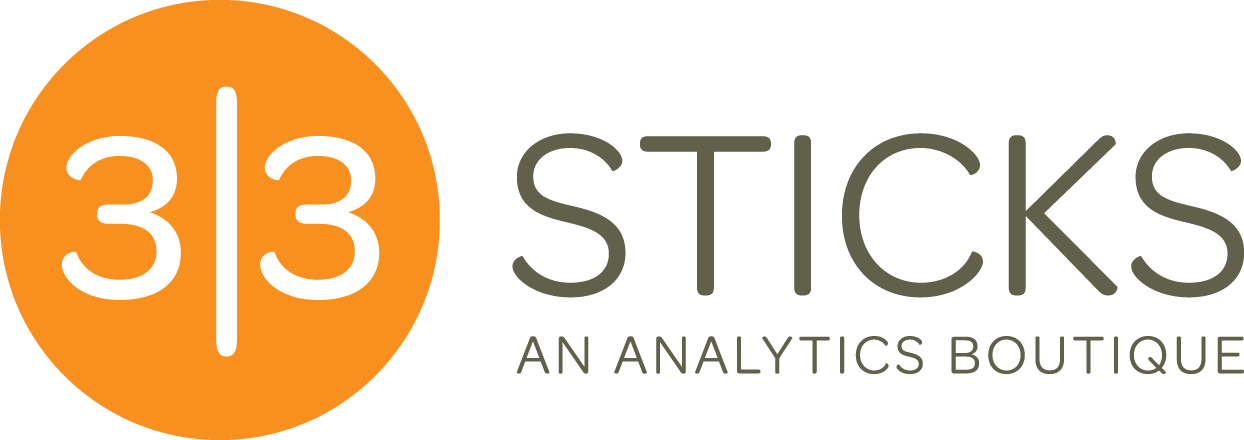The 33 Sticks FAQs for Humans, Not Algorithms
Because good questions deserve honest answers.
What exactly does 33 Sticks do?
We help organizations understand people through data. That means designing analytics ecosystems that are human-centered, reliable, and actually useful — not just dashboards and tags. We guide teams to ask better questions, collect more meaningful data, and make smarter, more empathetic decisions.
How are you different from other analytics consultants?
Most consulting firms sell hours. We sell outcomes. We don’t bury clients in jargon or deliverables that no one uses. We build long-term relationships, mentor internal teams, and leave you better than we found you. Our clients come to us because we care. We care about the people behind the data and the people using it.
Who do you usually work with?
We work with organizations that value collaboration, craft, and curiosity. Most of our clients have in-house analytics or product teams and want a partner who can help them level up, not just “do the work.” We intentionally limit the number of clients we take on so we can stay deeply invested in each one.
What’s it like to work with 33 Sticks?
Expect real conversations. Expect honesty. You’ll work directly with the same people you meet in the first call. No sales handoff. No “junior team” surprise. We meet weekly, share what we’re learning, and co-create your analytics and optimization roadmaps. Clients often describe us as the calm in the storm, a partner that makes data feel approachable again.
Do you only work with Adobe Analytics?
No. We’re tool-agnostic by design. We’ve worked with Adobe, GA4, Amplitude, Snowplow, and more but tools are never the hero of the story. Our real work is helping you build confidence in your data and your decisions.
How do you measure success?
When you no longer need us. When your internal team feels empowered, your stakeholders trust the data, and your analytics program has a soul again. That’s when we know we’ve done our job.
Why do you call yourselves a ‘refuge from consulting’?”
Because most of us came from traditional consulting and saw how toxic it could be. We built 33 Sticks as an antithesis: no burnout culture, no manipulation, no pretending. We invest heavily in our team’s wellbeing so they can bring their best selves to you. That’s not a marketing slogan, it’s our survival strategy.
Can we just chat before starting a project?
Absolutely. We don’t do pressure. If we’re a fit, you’ll know. If not, we’ll tell you honestly. Let’s talk — we promise it’ll feel more like coffee with a friend than a sales pitch.
Do you help with A/B testing and optimization?
Absolutely, but not the way most firms do. We don’t chase micro-conversions or test button colors. We help you build a sustainable experimentation program rooted in curiosity and learning. Our goal is to make testing a natural part of how your organization makes decisions, not a series of disconnected projects.
Can you help us build a personalization strategy?
Yes. And we start by making sure personalization has a purpose. We believe real personalization begins with understanding your audience, not their segments. We help you design frameworks that connect data, content, and intent so you can deliver experiences that actually mean something to people, not just serve dynamic content for its own sake.
Do you mentor analytics teams?
It’s one of our favorite parts of the job. Many clients bring us in not just to do the work, but to grow their team’s capability. We coach analysts, architects, and managers to build confidence, improve storytelling, and find balance between precision and pragmatism. Our mentoring isn’t formal training, it’s hands-on collaboration that quietly transforms how teams think and lead.
Do you work directly with executives on data strategy?
We do and it’s often where the most meaningful change happens. We partner with senior leadership teams to clarify what data actually needs to do for the business, cutting through noise and dashboards to focus on insight and alignment. That work often shapes vision, culture, and structure, making data a trusted ally instead of a constant argument.
